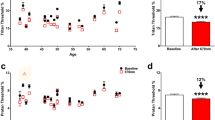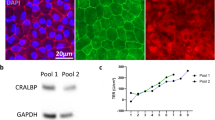Abstract
RETINENE, obtained by Wald from dark-adapted retinas, is defined as the chromogen responsible for a maximum at 664 mµ in the absorption spectrum of the blue solution obtained by mixing retinal extracts with antimony trichloride in chloroform. Such extracts show (in chloroform) an ultra-violet absorption band with λmax.385 mµ. It has recently been suggested1 that the chromogen is vitamin A aldehyde, and that it can be obtained by direct oxidation of vitamin A alcohol.
This is a preview of subscription content, access via your institution
Access options
Subscribe to this journal
Receive 51 print issues and online access
$199.00 per year
only $3.90 per issue
Buy this article
- Purchase on Springer Link
- Instant access to full article PDF
Prices may be subject to local taxes which are calculated during checkout
Similar content being viewed by others
References
Morton, NATURE, 153, 69 (1944).
Hunter and Hawkins, NATURE, 153, 194 (1944).
Author information
Authors and Affiliations
Rights and permissions
About this article
Cite this article
MORTON, R., GOODWIN, T. Preparation of Retinene in Vitro. Nature 153, 405–406 (1944). https://doi.org/10.1038/153405a0
Issue Date:
DOI: https://doi.org/10.1038/153405a0
This article is cited by
-
Physiologie der höheren Sinne bei Säugern und Vögeln
Journal für Ornithologie (1960)
Comments
By submitting a comment you agree to abide by our Terms and Community Guidelines. If you find something abusive or that does not comply with our terms or guidelines please flag it as inappropriate.



